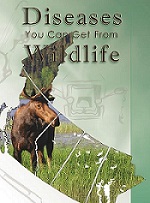Carnivore Health
B.C.’s meat-eating animals, or carnivores, have many different health concerns. Some concerns relate to the conservation of species at risk, while others relate to risks of transmitting disease to domestic animals and humans.
On this page:
Wild Dogs
B.C.’s wild dogs (or canids) – including wolves, foxes, coyotes – are thriving in B.C. But some canids in B.C. and Alberta are now being diagnosed with a tapeworm (Echinococcus multilocularis) that can also infect humans and domestic dogs.
Researchers have begun to study
- Where wild canids with this tapeworm are being found
- The genetics of the tapeworm, to help them understand where it came from
We are in the process of doing more research to better understand this risk to both humans and domestic animals in Western Canada.
Weasels
Animals in the weasel family (also called Mustelids) include:
- Otters
- Badgers
- Weasels
- Mink
- Marten
- Fisher, and
- Wolverines
Some of these, such as the American badger (Taxidea taxus), are threatened or endangered because of climate change, environmental contaminants, habitat lost to forestry, and infectious diseases.
We do not know much about the overall health and diseases of mustelids. Health testing and research to learn more will help us make management decisions to protect the species of mustelids that are at risk.
Some pathogens that have been identified in mustelids include
- Aleutian disease virus (ADV),
- Canine distemper virus (CDV), and
- Parasites such as Toxoplasma or Sarcocystis
Animal health specialists are researching these pathogens in mustelids, whether they may be causing population declines, and if there is a risk they could infect humans or domestic animals.
How Do I Protect My Pet?
- Learn about how tapeworms are transferred from one host to another
- Always clean up animal waste, using safe methods
- Keep your pet from eating rodents or other animals’ waste
- Talk to your veterinarian about getting your pet treated with a dewormer containing praziquantel. It is licensed for use in dogs and cats against Echinococcus
Read the booklet Diseases You Can Get From Wildlife (PDF, 8.6MB)
Learn about safe field dressing (PDF, 30kB)
Contact information
For wildlife-human interactions where public safety may be at risk call the Report All Poachers and Polluters (RAPP) line:
For wildlife health inquiries or reports:
250 751-7246

